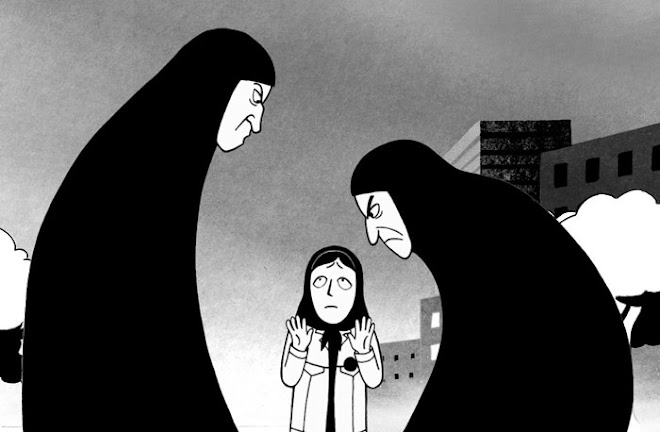During english class before Spring Break, we did a short writing session in class about literary perspectives. This is not the essay that is due tomorrow, however was just my thoughts at the time writing randomly in my journal. Please excuse any grammatical or mistakes that involve understanding existentialism.
According to a Persian philosopher, Mulla Sadra, "existence precedes essence." This, from what I understand, means that people have natural, scientific instincts that will overtake things that affect people such as religion and where a person was brought up. This statements makes sense, however can also be justified for the other way. Another belief is that people are a product of their place and time. This, in relation to Persepolis, makes complete sense. Marjane Satrapi, from what was written, is a rebel because her parents were rebels. However, if Mulla read Persepolis, he would think that all people are rebels inside, and that since that is true, Marjane's essence (Iran) also brought out her rebelliousness. My opinion is that people both have natural and relative meanings to themselves equally. People are not like other animals, we don't need only basic needs such as food and water to survive. We also need emotion, friendship, and love. I don't think this can be proven though, because as of what I know, there have not been scientific studies of humans living with only basic needs in a glass room or something.
In the movie, "Girl, Interrupted", the main character, Susanna, struggles with finding who and what she is, and feels she is wrongly diagnosed in the mental institute. I believe where she was brought up and her parent influenced who she became. Not because al humans are not intellectually and socially stable from the beginning. There was also another supporting character, Lisa, who frequently escaped the institute only to keep coming back for 7 years. Lisa, from the outside, could merely be labeled as a rebellious, outgoing and spontaneous person, however was deemed unfit for society. She was also labelled as promiscuious. These traits are all evident in every human being, however specific and sometimes amplified in others. There were also characters, such as a girl who set herself on fire. These, I thought, were more commonly suited for a psychological institution. Suicide, as I remember was also talked about with the study of existentialism. Albert Camus claimed that "there is only one truly serious philosophical problem, and that is suicide" in his "The Myth of Sisyphus". So, is this becasue of our place and time? Or is it because of our existence?
There is neither a right nor wrong answer but in Persepolis' case, I believe Marjane is a product of her place and time.
Marjane

Subscribe to:
Post Comments (Atom)




No comments:
Post a Comment